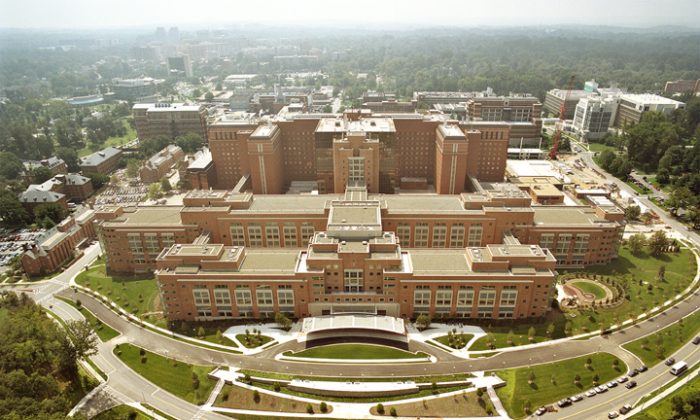January 7, 2019 Updated: January 7, 2019
The National Institutes of Health (NIH) has sounded a warning about China undermining research integrity. Among other issues at stake are the protection of intellectual property developed at U.S. institutions and the inappropriate use of U.S. academic funding.
The NIH report, “Foreign Influences on Research Integrity,” zeroes in on China’s “Thousand Talents Program,” which the Chinese regime has attempted to hide since the FBI began investigating it.
“NIH is aware that some foreign entities have mounted systematic programs to influence NIH researchers and peer reviewers and take advantage of the long tradition of trust, fairness, and excellence of NIH-supported activities,” the report says.
“Some foreign nations have created state-sponsored programs to recruit and sponsor skilled scientists, and a number of the violations NIH and recipient organizations have uncovered were made by members of such programs.
“Talent recruitment plans, such as China’s Thousand Talents Program, have been recently highlighted in the media. The Thousand Talents Program is reported to consist of some 56,000 recruits, including at least 6,000 top-tier recruits, across many scientific disciplines and at highly prestigious institutions, and its self-stated mission is ‘… to gather the global wisdom and create the China great exploit.’ One key qualification of its members is access to intellectual property (IP),” the report said.
While only a small fraction of foreign researchers in the United States are part of the Chinese program, many of the recruits have received U.S. federal funding from institutions that include the NIH, the report said.
Investigations
Lawrence Tabak, principal deputy director of NIH, said in an interview with The Epoch Times’ media partner NTD that NIH started an investigation of foreign threats to research after its own staff found some concerning instances.

Lawrence Tabak, principal deputy director NIH. (NIH)
At the same time, NIH also received warnings and suggestions from some law enforcement agencies.
On Aug. 21, 2018, NIH Director Dr. Francis Collins sent a letter to more than 10,000 organizations that are recipients of or applicants for NIH grant awards, and encouraged them to set up briefings with FBI field offices about threats to intellectual property and foreign interference.
Problematic examples identified by NIH include:
• “Identical or highly similar applications submitted for funding to both the NIH and a foreign entity, but without disclosure to NIH;
• “IP claimed by foreign governments rather than the U.S. government, even though support from U.S. government was clearly used for the discovery; and
• “Investigators failing to disclose foreign support to the U.S. institutions that are their employers.”
Tabak said that while NIH received roughly $39 billion in research funding from the U.S. government last fiscal year, only 11 percent of the funding was kept for internal use, with the rest going to 2,500 to 3,000 institutions around the United States, supporting 300,000-350,000 scientists across the country.
Tabak said that he couldn’t discuss any specific cases about how NIH funding was improperly used by foreign nations, but said that “there are some examples of where that has been used in a foreign nation to create companies without acknowledging or due credit to the works supported by the U.S. government. Patents and so forth are filed only in the foreign nations, not in the U.S. system.”
Espionage
The concerns about the Thousand Talents Plan occur within the context of a growing awareness in the U.S. government of the threat of Chinese espionage.
At a Senate Judiciary Committee hearing on “China’s Non-Traditional Espionage Against the United States: The Threat and Potential Policy Responses” on Dec. 12, committee Chairman Chuck Grassley (R-Iowa) said in his opening remarks, “When it comes to espionage, FBI Director [Christopher] Wray has said, ‘There’s no country that’s even close to the People’s Republic of China. General Keith Alexander called China’s estimated gains from economic espionage, of up to $600 billion, ‘the greatest transfer of wealth in history.’
“China is believed to be responsible for 50 to 80 percent of cross-border intellectual property theft worldwide, and over 90 percent of cyber-enabled economic espionage in the United States.”
The abuse of U.S. grants and positions is an open secret among Chinese-American academics.
One Chinese-American academic, who spoke on condition of anonymity, told The Epoch Times that it is fairly common for Chinese-American academics, especially those work at U.S. universities, to take “extra positions” in China.
“They are paid full salaries in the U.S. At the same time, they take positions in China, as well. Some have labs in both countries; some even recruit and mentor their own graduate or postgraduate students in China.”
This academic said his former mentor in a U.S. university has done so, and still travels to China regularly. He has partners in China, and they were able to use the fruits of his research and ideas gained in the United States to obtain funding of more than 100 million yuan ($14.6 million) from the Chinese state.
U.S. universities should adopt policies that are as strict as government guidelines, in terms of staff management, to tackle this issue, the academic said.
Also, those who choose to return to China for work, he said, shouldn’t be allowed to continue work at U. S. universities at the same time, and shouldn’t be allowed to take anything from their U.S. employers.
The FBI can find the academics who “straddle two boats at the same time” by looking for articles published in magazines such as “Science” and “Nature,” he said. If the author is affiliated with both a U.S and a Chinese institute, or acknowledges both a U.S and a Chinese institute, it is highly possible that he or she works for both countries simultaneously.
Going Underground
In response to mounting U.S. criticism of the Thousand Talents Program, the Chinese regime has sought to erase the public record of its existence.
According to Radio Free Asia, an internal document issued by “Review Working Group for Youth Talents under ‘Thousand Talents Program’” on Sept. 29, 2018, requires that “In order to better ensure the safety of overseas talents, (Chinese) institutes should not use emails to send out interview notifications.
“Instead, they should use telephone, fax, and other channels to notify the interviewees; and the notifications should be in the format of invitation to academic conferences and forums (as opposed to interviews). No such text as ‘Thousand Talents Program’ should appear in the written notifications.”
According to a report by the Chinese-language Epoch Times, in order not to draw the attention of the FBI, the Ministry of Education of the People’s Republic of China required Chinese universities to delete information related to the Thousand Talents Program from their websites.
The Epoch Times verified this by checking the websites of Beijing University, Tianjin University, and a few others, and couldn’t find any information related to the Thousand Talents Program.
Before the FBI initiated its investigation of the Thousand Talents Program, many Chinese universities and research institutes would proudly publish the names of the “talents” they had successfully recruited from overseas countries.
Source: https://www.theepochtimes.com/nih-calls-out-china-for-violating-research-integrity_2759555.html

The Mark O. Hatfield Clinical Research Center on the National Institutes of Health Bethesda, Maryland campus. (NIH)
